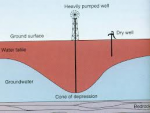
Once when he was asked why he’s so involved in public issues, Vance Kennedy replied, “It’s my way of paying back for the opportunities I was given in public service. When I was with the [U.S. Geological] Survey (USGS), I got to do a lot of research, and I’ve always been thankful for the opportunity.”
It could probably be argued that Kennedy’s work alone gave the public plenty of payback. Because of his pioneering research into such things as the sources of acid rain, Kennedy received the highest award possible from the USGS.
An Incomplete Picture
These days, Kennedy’s major concern is our widespread misunderstanding of groundwater. The big problem is we have the wrong picture in our heads.
“When people think of groundwater,” says Kennedy, “they think of the ‘cone of depression.’ But that’s not really the correct image.”
According to Kennedy, groundwater travels along an underground network very much like streets and highways in “three dimensions.” There’s often lots of horizontal flow, which explains why it’s easy to draw water from a neighbor, even one who’s thousands of feet away.
It also explains why so much groundwater is present near rivers, lakes and reservoirs. It’s the result of horizontal permeability. Kennedy says it’s crucial to understand the science of groundwater because our current “picture” has led to abuse of a precious resource.
“Groundwater is like our savings account,” says Kennedy. “It should be used for emergencies.”
But just as it was in the past, groundwater today is used as though it’s a readily renewed resource. It’s also used as though it’s owned by the person who owns the well above it. That’s because our understanding of groundwater is either incomplete, erroneous, or both.
Much of the groundwater that’s already been pumped on Stanislaus County’s east side was at least a thousand years old—that’s how long it took to charge from rainfall. That means that that water is for practical purposes gone no matter how hard it rains in the next few years.
Other groundwater is replenished by horizontal flow from nearby reservoirs, including Modesto and Woodward Reservoirs. The Tuolumne and Stanislaus Rivers also contribute to groundwater reserves.
“It’s very likely that some of the aquifer under Modesto has been deposited by the Tuolumne River,” says Kennedy. “That river runs right alongside the city.”
If much groundwater is the result of lateral input from lakes, reservoirs and rivers, it means that water designated for public use is routinely appropriated for private use. The notion that someone “owns” all the water under his land is based on a faulty understanding of how groundwater is deposited and flows.
Drip Irrigation? It’s Not that Easy
Ordinarily, we think of drip irrigation as a conservation measure that maximizes the benefits of irrigation with groundwater, but that’s not always the case.
“It’s not an unalloyed benefit,” says Kennedy.
Drip irrigation, when done properly, is expensive and time-consuming. When done improperly, it hastens the accumulation of salts in the soil and has no recharge effect on the aquifer. In short, drip irrigation is sustainable only when growers are willing to take on the extra expense it takes to keep it from poisoning the soil and draining the aquifer altogether.
“A plant’s roots reject salt,” says Kennedy. “Otherwise there would be a buildup of salt inside the plant.”
The San Joaquin Valley is severely afflicted by salinization, the result of intense irrigation without proper safeguards. Nonetheless, instead of addressing the problem, we seem intent on making it worse.
These days, Vance Kennedy’s sense of urgency has been quickened by the prospect of global warming. He feels it’s imperative that we take out some “insurance” for the likelihood of water shortages even greater than those of today. The insurance would come in the form of a statewide water policy based on sound science rather than on political machinations and misunderstanding of the facts.
As for the lack of rules about groundwater use today, Kennedy offers a simple assessment: “It’s insanity,” he says, shaking his head.
